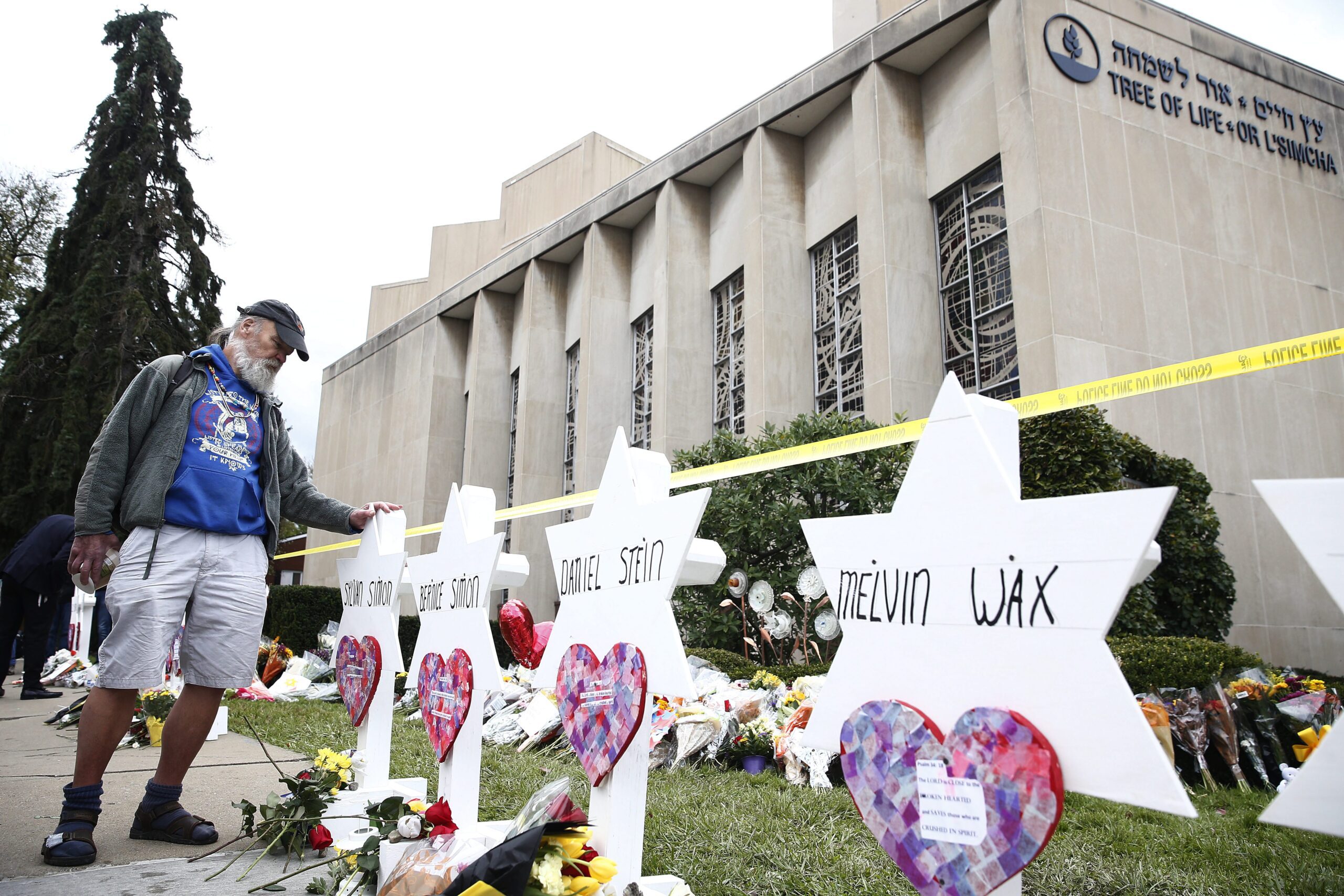Nov. 9 is the 80th anniversary of Kristallnacht, the Night of Broken Glass, when Nazi stormtroopers, Hitler Youth and German civilians staged a two-day terror campaign destroying thousands of Jewish stores, schools, cemeteries and synagogues. They murdered nearly 100 of us and sent 30,000 more to concentration camps in a pogrom now seen as the start of the Holocaust.
Nov. 10 is the two-week anniversary of the Tree of Life synagogue terror attack in Pittsburgh, when an anti-Semite shouting “All Jews must die!” slaughtered 11 in their place of worship. It was the largest Jewish massacre in American history. One of those in shul that day was a Holocaust survivorbecause, lest we forget, it happened one single lifetime ago. “It just never ends. It’s never completely safe for Jews,” Judah Samet told CNN. “It’s in the DNA. Not just America’s DNA but the world’s.”
These outbursts of anti-Semitic violence—and the ever-present hate speech that inspires them—are why I will always be proud of being a Jew despite not believing in God.
These are not unrelated. How could I believe in a God that allowed the Holocaust to happen? If He was all knowing, then He would have known about it. If He was all powerful, then He could have stopped it. And if He was all good, then He would have stopped it.
It was not stopped.
But this inexplicable hatred is also why I would never deny my Judaism. They have never cared about religious beliefs. They care about blood. So do I. I’m a Jew because my parents are Jewish and their parents and so on back forever. Judaism is my ethnicity and it is my culture, and it doesn’t have to be my religion just because we use the same word for all three.
Being Jewish is about sharing a storied history. One of the constants in those stories is persecution, and it’s not ancient history. The reason I exist is because, after my great-grandparents’ Jewish shtetls were burned down in Russian pogroms, they fled to Canada. This was before the Holocaust and before Canada’s “none is too many” anti-Semitic immigration policy locked them out. My zaida, my son’s namesake, was born in Paris where his parents sojourned for a few years before boarding a steamship to Montreal.
Imagine if they’d stayed in France. I have.
Watching newsreel footage of Jewish bodies bulldozed into mass graves during high-school history was horrific for everyone. But I was the only Jew in class. All I could think of was how close my grandfather came to that grave.
When I later attended university in France, I saw “former Jewish neighbourhood” in every European city map. In Germany, I went to Dachau to see why. In Venice, I visited the site of the first Jewish ghetto and put on tefillin to pay tribute.
Another anti-Semitic incident hit the news recently. An adaptation of The Merchant of Venice, set in Nazi Germany, was performed at Bishop Strachan School in Toronto. The audience was encouraged to participate with chants of “Burn the Jews!”
This inexplicable hatred is also why I would never deny my Judaism. They have never cared about religious beliefs. They care about blood.
I’ve no doubt the purpose was to teach that anti-Semitism is bad—though there’s a reason this particular Shakespeare play was performed on German radio after Kristallnacht, and later in Vienna to celebrate the city becoming judenrein (cleansed of Jews). But intentions are irrelevant. “Jewish students whose families were personally affected by the Holocaust were made to feel extremely uncomfortable and alienated as the production encouraged their fellow students to laugh at the horrific events and cheer anti-Semitic chants,” wrote parents in an angry letter. The idea was to make the young audience feel complicit in the hate, they just forgot about the kids on the receiving end.
To be Jewish is to too often feel extremely uncomfortable and alienated, if not outright scared. As a child, I was sent into the hallway while my first-grade class recited the Lord’s Prayer. As a teen, I overheard kids on the school bus complaining about “getting Jewed out of money.” As a young backpacker, someone, who didn’t know I was Jewish, told me “I love everyone. Mais pas les Juifs (but not the Jews). Jews in the fire!” As a grown man, I see my name online with triple parenthesesaround it to mark me as a Jewish journalist, a lügenpresse, to use the Nazi phrase that returned to vogue at Trump rallies. And as a parent, I saw my son, who had just learned to read, break into tears seeing bathroom graffiti with a swastika that read “F**k the Jews.”
Anti-Semitism is currently surging—not just the Tree of Life attack or last summer’s tiki torch-wielding neo-Nazis, but also the constant “globalist” and George Soros dog-whistles and conspiracy theories about cultural Marxism. But as Judah Samet said, it has always been here.
And it has always partly defined my Jewish identity. But it has strengthened me, too, because there is another constant to Jewish stories—perseverance. And that is something I will always believe in.
















Работа в Перекрёстке Набережные Челны